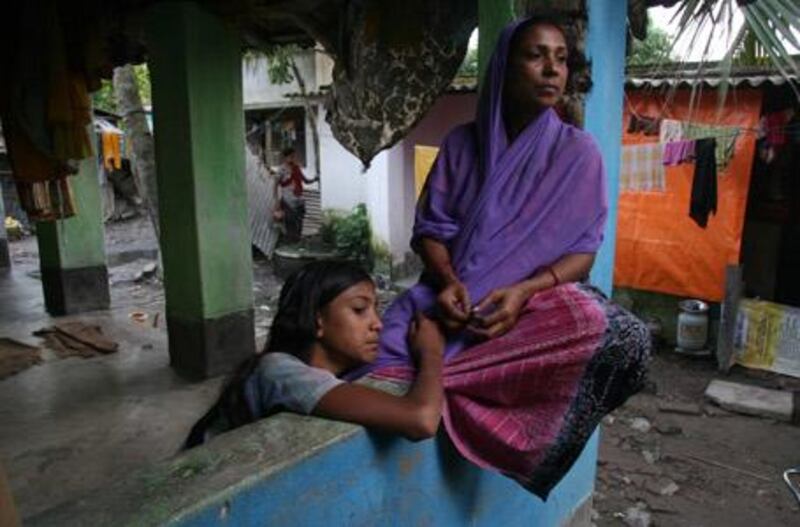KOLKATA // While some Muslim clerics have disagreed with a recent Indian Law Commission report saying bigamy is against the "letter and spirit" of true Islam, many Indian Muslim women, both single and married, say bigamy and polygamy should not be accepted in any society.
In the report presented to government last week the commission said: "We fully agree with the fact that traditional understanding of Muslim law on bigamy is gravely faulty and conflicts with true Islamic law in letter and spirit." Even though the commission stopped short of recommending reforms, fearing it could trigger an "unhealthy controversy", a powerful clerical body said that it could not tolerate any criticism of Islamic law, or Sharia.
"Justice is the basis of bigamy. The commission should also know that this issue is outside its purview," Syed Qasim Rasool Ilyas, the spokesperson of the All India Muslim Personal Law Board, said in an interview. Some Muslim women, however, believe married men commit bigamy or polygamy out of lust and take advantage of Sharia to justify their behaviour. "My husband suddenly married a younger woman and began living with her some months ago without divorcing me. I could not get any action taken against him simply because of the Muslim law, which allows him to keep four wives," Azra Begum, the first wife of a Muslim butcher in West Bengal, said. "I have been forced into miseries since he was the sole breadwinner for our family. His new marriage has also been humiliating and embarrassing for me and my daughter."
The commission report was prepared in connection with a legal case in which a Hindu man converted to Islam to be able to marry a woman without divorcing his first wife. It said that while it is generally believed that "under Muslim law, a husband has an unfettered right to marry again even where his earlier marriage is continuing ... [on] a closer examination of the relevant provisions of the Quran and other sources of Islamic law, this does not seem to be true".
The commission said that courts in India also looked down upon bigamy and considered first wives of bigamist husbands as victims in most cases and provided many forms of relief to them. "Several high courts have held that bigamy amounts to cruelty, which can be pleaded as an answer to the man's suit for restitution of conjugal rights against the first wife. In one case, the Supreme Court had observed that there was no difference between a second wife and a concubine," the report said.
"Muslim society [in] India in general looks at polygamy with great disfavour and a bigamist is looked down upon in and outside his family. Unfortunately, religious leaders are not prepared for any legislative reform in this respect and religious sensitivities have never allowed the state to introduce any reform in this regard." Although the commission noted that bigamy was not common among Indian Muslims and "cases of [Muslim] men having more than one wife ... are few and far between", Maolana Abdul Khaleque Madrasi, on behalf of the Islamic institution Darul Uloom Deoband, said that Muslim clergy would not tolerate any reading of Muslim law that was tantamount to interference into Islam.
"[The] Indian constitution provides religious freedom to all citizens. A Muslim man can marry more than once, as Islam permits it. We condemn this [law commission] report," Mr Madrasi said. Aziz Mubaraki, spokesman of Kolkata's Tipu Sultan Masjid, said the Muslim personal law was perfect and only those who had no knowledge of Islam or Muslim personal law could call any part of it "gravely faulty".
"Islam permits up to four marriages, but in very stringent conditions. However, some Muslim and non-Muslim men might be committing bigamy or polygamy even in the absence of such conditions just to fulfil their sexual urge in a mischievous way. Muslim personal law should not be blamed for the fault committed by some sex-maniac men," Mr Mubaraki said. "Islam does not allow a marriage which is driven only by physical attraction and sex."
Other Muslim scholars supported the commission's findings. "The system of bigamy is inherently unfair to women and such practices should be stopped," said Arshan Alam, an assistant professor at the Centre for Jawaharlal Nehru Studies in Jamia Millia Islamia in New Delhi. The chairperson of the Muslim Women's Personal Law Board in Lucknow, Shaista Amber, said: "Since the system [of bigamy and polygamy] is being misused, there should be some control over it. Muslim laws permitting bigamy or polygamy are extremely strict but they are not being followed properly."
Earlier this year, the Delhi-based Allama Rafiq Chariatable Trust conducted a survey among Muslim women in Delhi and western Uttar Pradesh and found that 96 per cent were against bigamy. "Very surprisingly, except for just five women, all of them said that they did not approve that their husband, father or brother married more than once," said Maqsood Ahmed, the president of the trust. Ms Begum said until a woman experiences what she went through, it is impossible to fathom the repercussions that a husband's additional marriages can have.
"People in our village called us ideal lovers, until my daughter was born. Then, suddenly, 15 years after the marriage, he fell in love with a younger woman and dumped me last year," said Ms Begum, who recently joined a bulb-making factory as a labourer. "He has taken a second wife illegally. I loved my husband, I was healthy and I was able to perform all duties that a wife is supposed to do. But I know I cannot get justice now simply because he is Muslim and has the so-called right to keep up to four wives. I am devastated."
@Email:sarahman@thenational.ae





